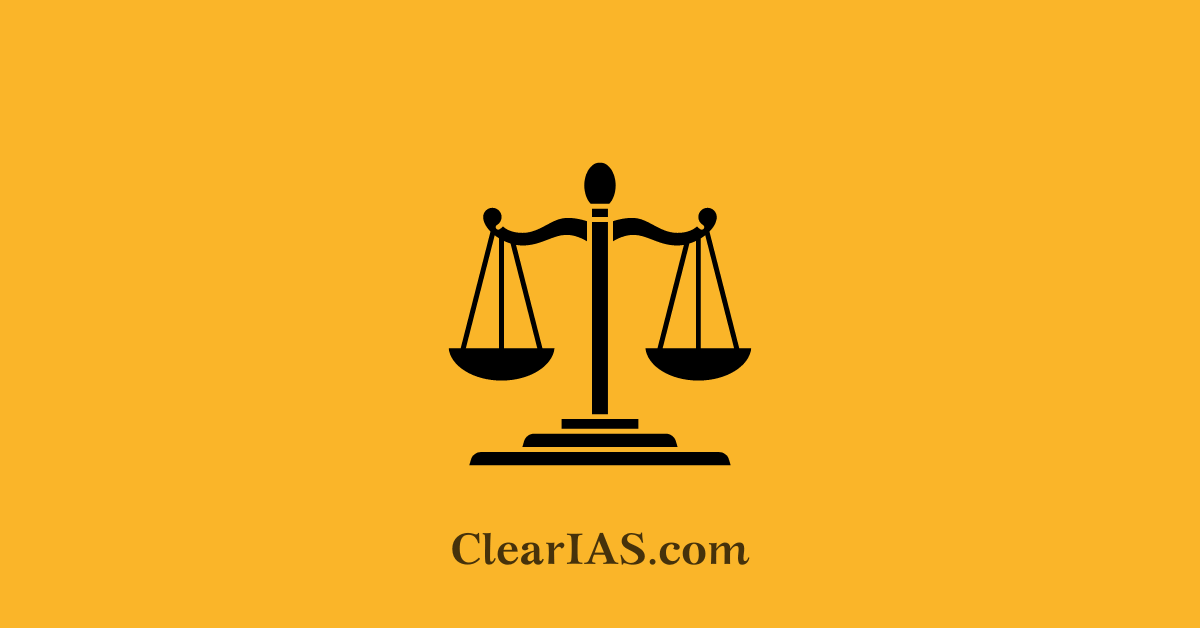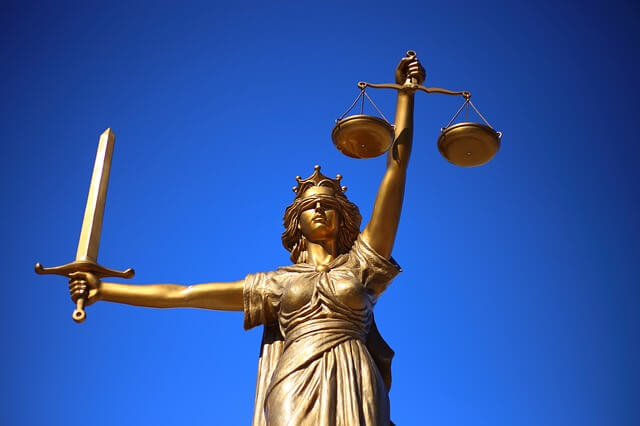
In this post, we shall see the meaning of two important terms often cited in Supreme Court Judgments ie. Procedure Established by Law and Due Process of Law.
“Procedure Established by Law” and “Due Process of Law” are two legal principles that relate to the protection of individual rights and the application of law in legal proceedings. While these principles may seem similar, they have distinct implications and are used in different legal systems around the world.
The former is Indian constitutional doctrine and the latter is American, but now the boundaries are very narrow.
Let’s start our discussion with Article 21 of the Indian Constitution. What does it say?
Also read: Sealed Cover Jurisprudence
Article 21 in The Constitution Of India
Protection of life and personal liberty: No person shall be deprived of his life or personal liberty except according to the procedure established by law.
Article 21 of the Indian Constitution uses the term “Procedure Established by Law,” which means that no person shall be deprived of their life or personal liberty except according to a procedure established by law.
This implies that if the government follows the prescribed legal procedures while depriving a person of their life or liberty, it is constitutionally valid, irrespective of whether the procedure is fair, just, or reasonable.
Procedure Established by Law vs Due Process of Law
As we have seen, the term “procedure established by law” is used directly in the Indian constitution. Due Process of Law has much wider significance, but it is not explicitly mentioned in the Indian Constitution. The due process doctrine is followed in the United States of America, and Indian constitutional framers purposefully left that out. But in most of the recent judgments of the supreme court, the due process aspect is coming into the picture again. Let’s see the difference in detail.
Case 1: Procedure Established by Law
“Procedure Established by Law” is a principle that is primarily associated with legal systems based on common law, including India. In countries following this principle, the government enacts laws, and individuals must comply with those laws.
The government has the authority to set the procedures and processes for implementing and enforcing these laws. Under this principle, as long as the government follows the procedures it has established, its actions are considered valid, even if they may appear unfair or unjust to individuals.
It means that a law that is duly enacted by the legislature or the concerned body is valid if it has followed the correct procedure. Following this doctrine means that, a person can be deprived of his life or personal liberty according to the procedure established by law.
So, if Parliament passes a law, then the life or personal liberty of a person can be taken off according to the provisions and procedures of that law.
This doctrine has a major flaw. What is it?
It does not seek whether the laws made by Parliament are fair, just, and not arbitrary.
“Procedure established by law” means a law duly enacted is valid even if it’s contrary to principles of justice and equity. The strict following of the procedure established by law may raise the risk of compromise to the life and personal liberty of individuals due to unjust laws made by the law-making authorities. It is to avoid this situation, SC stressed the importance of the due process of law.
Case 2: Due Process of Law
Due process of law doctrine not only checks if there is a law to deprive the life and personal liberty of a person but also sees if the law made is fair, just, and not arbitrary.
If SC finds that any law is not fair, it will declare it null and void. This doctrine provides for a more fair treatment of individual rights.
Under due process, it is the legal requirement that the state must respect all of the legal rights that are owed to a person, and laws that the state enacts must conform to the laws of the land like – fairness, fundamental rights, liberty, etc. It also gives the judiciary to access fundamental fairness, justice, and liberty of any legislation.
“Due Process of Law” is a legal principle commonly found in legal systems based on the common law tradition, particularly in countries like the United States.
- Under this principle, the government must follow fair and just procedures before depriving an individual of life, liberty, or property. Due process ensures that individuals have the right to be heard, to present evidence, and to be treated fairly before any government action is taken against them.
The difference in layman’s terms is as below: Due Process of Law = Procedure Established by Law + The procedure should be fair and just and not arbitrary.
Also read: Must Know Articles of Indian Constitution
Extra Articles worth reading
- Of constitutional ‘due process’: The Hindu – Are we shifting from original constitutional norms?
- On MCOCA: Tehelka – A Law Inconsistent With The Idea Of India.
- Due Process of law: Manupatra.
History of Due Process of Law

Due process developed from clause 39 of the Magna Carta in England. When English and American law gradually diverged, due process was not upheld in England but did become incorporated into the Constitution of the United States.
Unlike “Procedure Established by Law,” “Due Process of Law” requires the government to respect certain fundamental rights and treat individuals fairly and impartially. It places a higher emphasis on individual rights and procedural safeguards.
In the United States, the Fifth and Fourteenth Amendments of the U.S. Constitution include the Due Process Clause, which prohibits the government from depriving any person of life, liberty, or property without due process of law.
Procedure established by law: Maneka Gandhi vs Union of India case (1978)
In India, a liberal interpretation is made by the judiciary after 1978 and it has tried to make the term ‘Procedure established by law’ synonymous with ‘Due process’ when it comes to protecting individual rights.
In the Maneka Gandhi vs Union of India case (1978) SC held that – the ‘procedure established by law’ within the meaning of Article 21 must be ‘right and just and fair’ and ‘not arbitrary, fanciful or oppressive’ otherwise, it would be no procedure at all and the requirement of Article 21 would not be satisfied. Thus, the ‘procedure established by law’ has acquired the same significance in India as the ‘due process of law clause in America.
Conclusion
“Procedure Established by Law” focuses on the formal adherence to legal procedures set by the government, while “Due Process of Law” emphasizes the protection of individual rights and fairness in the application of law and legal proceedings.
The choice between these principles has significant implications for the protection of individual rights in a legal system.






thanking u sir .very useful information about civil services .i more like this website.finally once again thanking u sir ………
excellent work sir. thank u very much for Ur extraordinary efforts to encourage the students . keep motivating .
Thanks a ton. This concept has been puzzling be for a long long time. Now its clear.
really helpful
thanks.
Thanks for describing clear views
In order to surmount the uncertainty, which would arise because of broadening of scope of rights
like in America, Indian constitution makers restricted it to procedure established by law.16 The
phrase “procedure established by law” seems to be borrowed from article 31 of the Japanese
Constitution, which gives the legislature the final word.
Clear and to the point explanation, thank you Sir!
https://www.frontline.in/static/html/fl2905/stories/20120323290507900.htm
tell me the difference between Due Process of Law and Procedure established by Law?
Me: Sir, Procedure Established by Law is any procedure which may be established by a duly enacted legislation or made by the administration while Due process of Law involves the principles of natural justice. Here the Law itself have to be just and can be questioned in the Courts.
CM: When this Due Process did enter our constitution?
Me: Sir, In Menaka Gandhi’s case in 1978.
CM: Tell me what happened in the Menka Gandhi case?
Me: Sir, the passport of Menaka Gandhi was impounded by the airport authorities and proper hearing was not given to her. The Supreme Court held that the principles of natural jutice have not been followed and struck down the decision of the authorities.
Nice explanation sir, thank you
Very informative
This website is so good… It not only provides knowlege about imp topics but that too in a very clear and understable way… I find this website soooooo useful…. Thank u ???
Clearly explained, in a very brief manner.!👍 Thank you.
Judicial review resemble the due procedure of law as it makes Indian parliament not soverign.
Thanks a lot sir,,,,,
You’ve just copied it from quota and pasted it here without giving due credits to the author. This act of yours amounts to theft of creative work, will gradually lower the standard of UPSC preparation. Make sure not to steal somebody’s work instead produce your own.
Hi Manonmani,
Being an aspiring civil servant, you should be able to see both sides. Why didn’t you think if it is actually the reverse?
In fact, it is.
We have written about “Procedure Established by Law vs Due Process of Law” in 2014, and many copied the same from ClearIAS.com and posted in Quora in 2015, 2016, and 2017 – without giving any credit to us. Just do a Google Search “Procedure Established by Law vs Due Process of Law” and notice the dates coming up.
PS: Hope you meant ‘Quora’ when you typed ‘Quota’.
When I typed ‘Procedure established by Law’ on Google first the article from Quora appeared. After reading that I went through the same worded article here. That’s what I was enraged. And the autocorrection option in my keypad automatically tries to correct the words. I remember of typing ‘Quora’ but it later changed to quota that I overlooked.
Galti se sikh lo dear.. bina sabuto ke kisi pr iljamat nai lagate.
really nice explained. thank u so much
Good explanation,sir
Sir,
Do we accept procedure established by law from Japan??
Sir, based on the Article 32 and Article 226 the person can go to the court if his and her rights are getting violated. Isn’t that solve this flaw?
Thank u
really appreciate you.